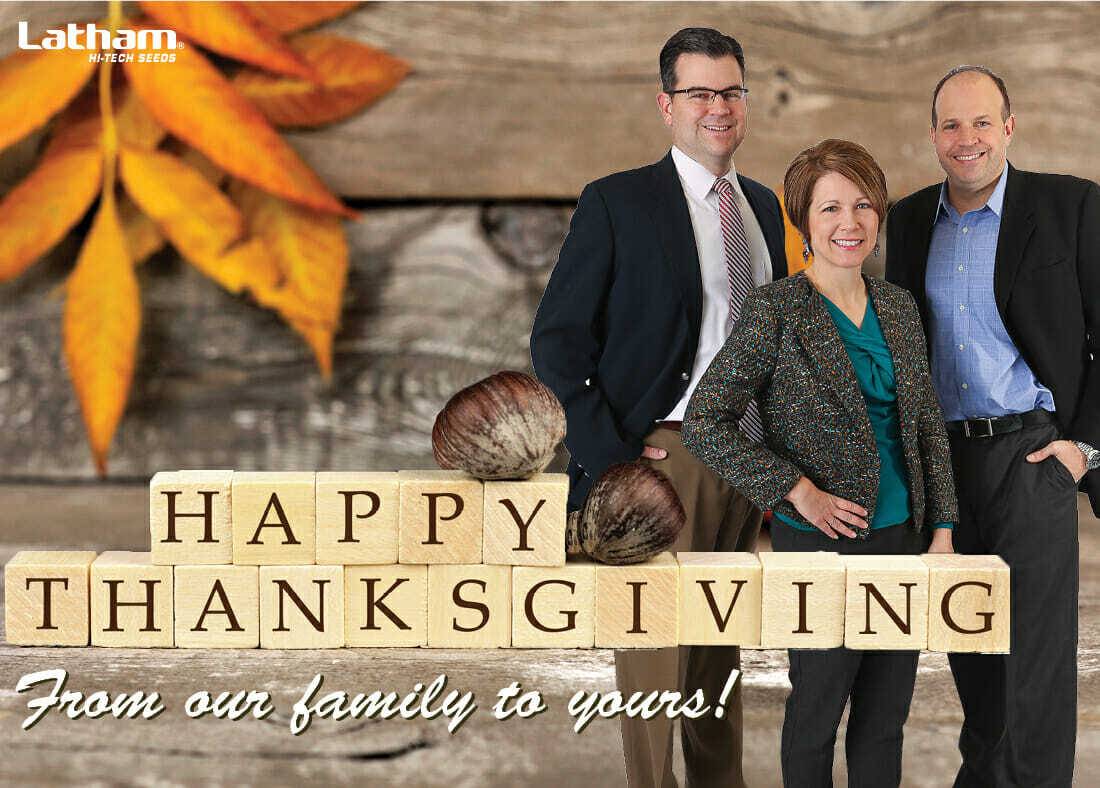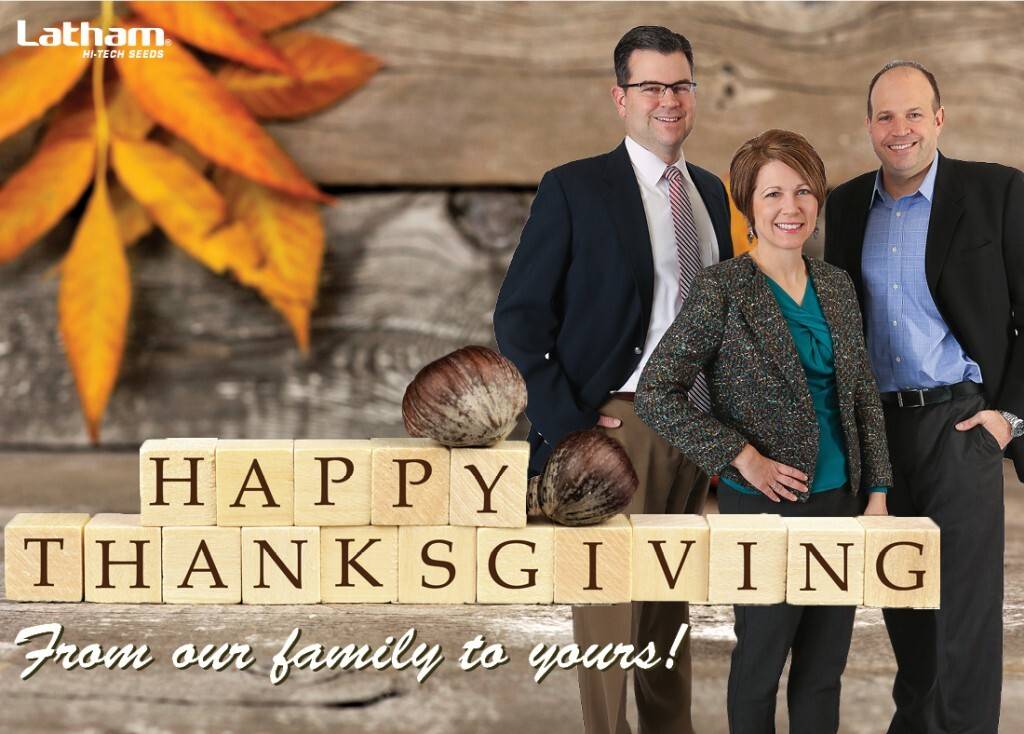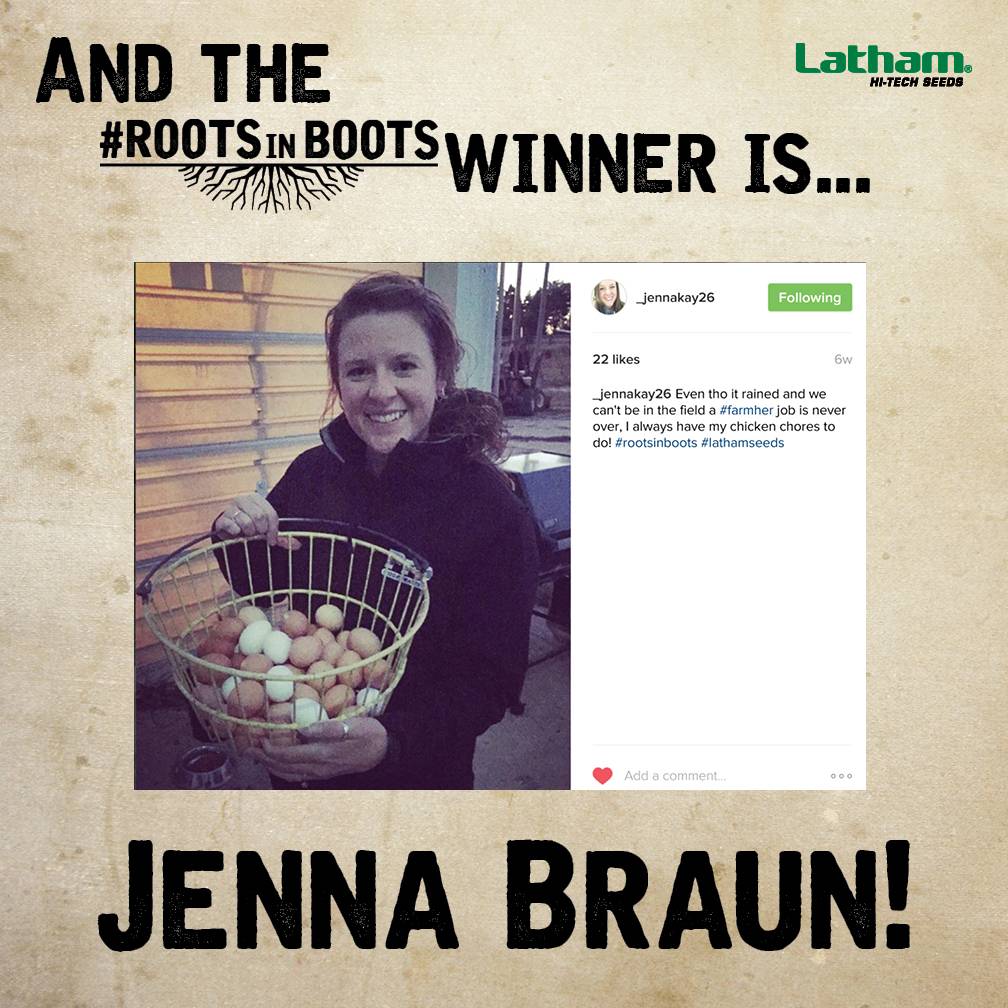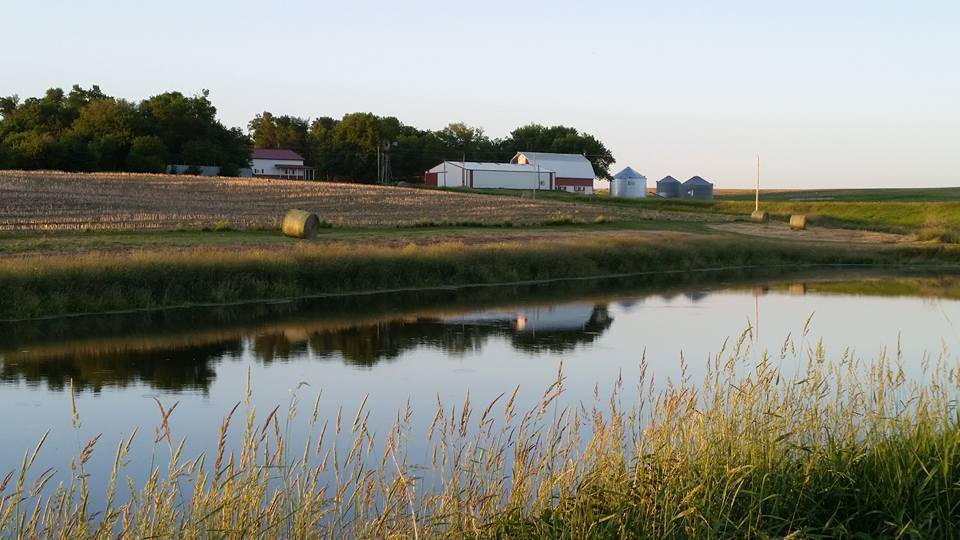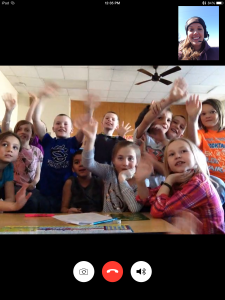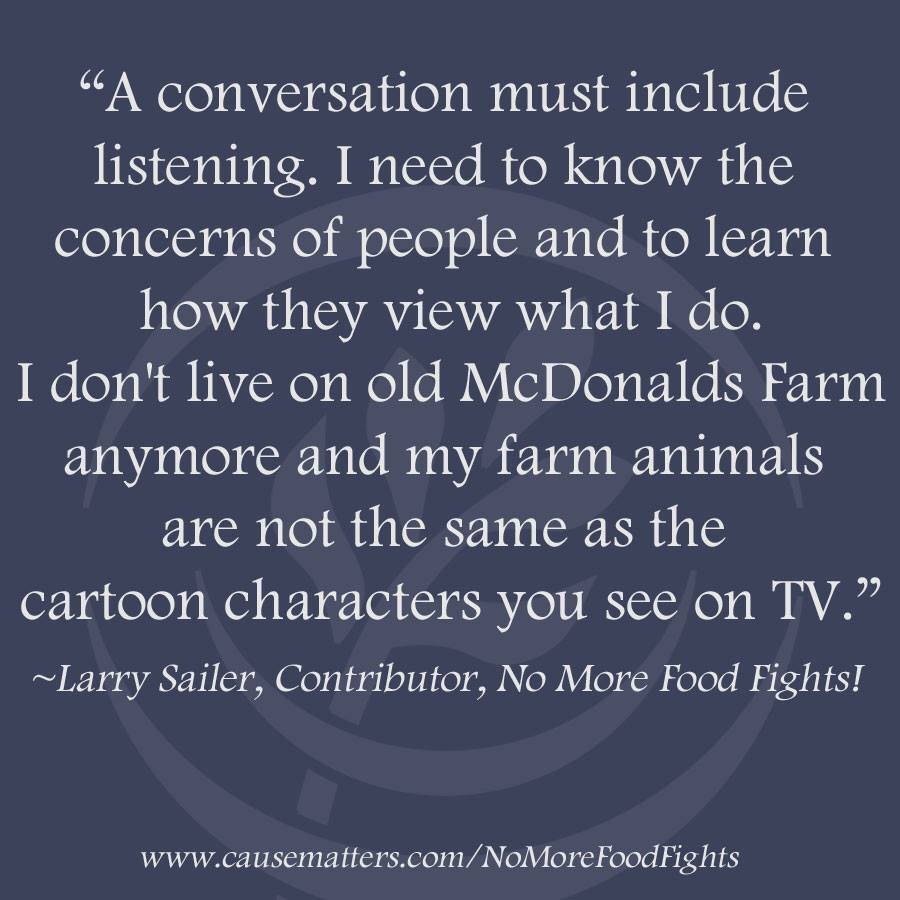-
Latham Hi‑Tech Seeds
This Tattoo is More than Meets the Eye
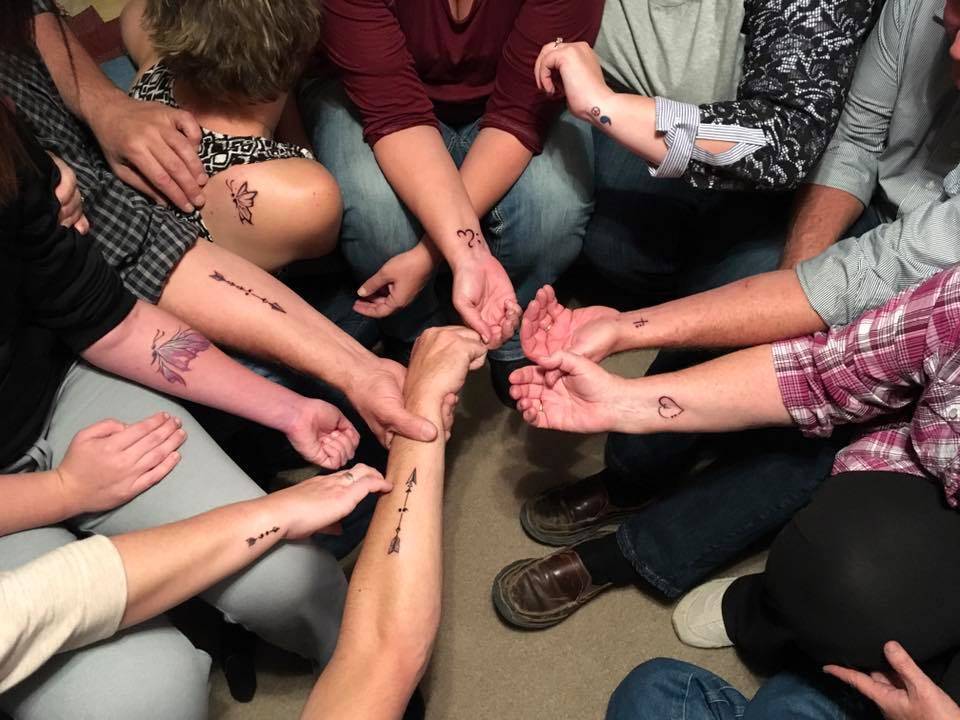
What does suicide prevention and a presentation by an anti-modern farming activist from India have in common? You might be surprised…
A “rock star of the GMO protest movement,” Vandana Shiva, delivered a speech Nov. 16 at Drake University in Des Moines. If you aren’t familiar with Shiva’s views, here’s the Genetic Literacy Project’s link to why she is saying such awful things about GMOs.
I was alerted to Shiva’s speech by my friend Cristen Slings Clark, who blogs at Food & Swine. Cristen asked if I could accompany her to this speech, but unfortunately, I was working in southern Illinois at the time. Fortunately, other Iowa farmers and advocates were in the crowd.
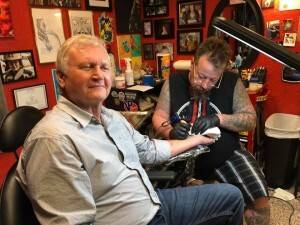 One Iowa farmer challenged activist Vandana Shiva after “myth-filled” anti-GMO lecture during the Q&A session. I read about it in an article posted by the Genetic Literacy Project. That farmer who wrote that piece was my friend Michelle Miller, who goes by “Farm Babe” on social media. Michelle did a terrific job writing the article! Naturally, The Des Moines Register also published an opinion piece about the event by my least favorite writer Rekha Basu. I encourage you to read both articles, as well as do more research on your own. While I don’t share Vandana’s view on modern farming, she talked about another problem in India that is near to my heart and that’s farmer suicide. She claims that the use of GMO seeds has caused thousands of India’s farmers to take their own lives! Extreme stress is felt by many farmers, but I believe GMO seeds ease the burden. It makes me mad that this lady from India is getting rich by giving speeches filled with lies!
One Iowa farmer challenged activist Vandana Shiva after “myth-filled” anti-GMO lecture during the Q&A session. I read about it in an article posted by the Genetic Literacy Project. That farmer who wrote that piece was my friend Michelle Miller, who goes by “Farm Babe” on social media. Michelle did a terrific job writing the article! Naturally, The Des Moines Register also published an opinion piece about the event by my least favorite writer Rekha Basu. I encourage you to read both articles, as well as do more research on your own. While I don’t share Vandana’s view on modern farming, she talked about another problem in India that is near to my heart and that’s farmer suicide. She claims that the use of GMO seeds has caused thousands of India’s farmers to take their own lives! Extreme stress is felt by many farmers, but I believe GMO seeds ease the burden. It makes me mad that this lady from India is getting rich by giving speeches filled with lies!I agree, however, that suicide is a serious issue worldwide. My family has personally been affected by suicide. If you read my blog regularly, you know that I believe mental healthcare is a real need especially in rural areas. That why last Saturday – when our five kids, 10 grandkids, one great granddaughter and many in-laws gathered to celebrate Thanksgiving – we also got semi-colon tattoos.
Why? One of our daughters suggested we get tattoos and join the growing movement of Project Semicolon that honors the memory of loved ones while raising awareness of mental illness and suicide.
A semicolon is used when an author could’ve ended the sentence but chose not to. “The author is you and the sentence is your life.” Not being a good writer nor a good English student many years ago, I wasn’t even aware of how a semicolon was meant to be used. But getting a tattoo of a semicolon to symbolize a life not finished made sense!
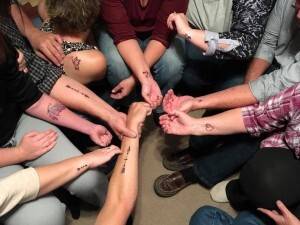 Nine family members, including me and my wife, had various semicolon designs tattooed on to them last Saturday. The reaction from our kids and grandkids to Grandma and Grandpa getting “tats” made for a very interesting day, but the closeness we felt afterwards and the meaning behind the tats made for a very meaningful Thanksgiving. There were tears shed for our lost family member, but I believe those were healing tears. Farmers are not the only people prone to suicide and mental health stress. Veterans come readily to mind as I’m very concerned about the condition of our returning soldiers. We have family members who have served, so I know military service changes people. Many Americans think of the soldier lost in battle, but returning soldiers often have more problems than the physical harm to their bodies. I’m thankful for all the men and women who have served and for those who continue to serve, so that we may enjoy our freedoms including free speech. I’m also thankful for the technology that allows farmers to feed more families, more efficiently, than ever before. (By the way, The American Farm Bureau Federation’s annual survey of food prices put the average cost of a modest Thanksgiving dinner down about 24 cents from 2015. It costs less than $5 per person to feast on this traditional holiday meal.)
Nine family members, including me and my wife, had various semicolon designs tattooed on to them last Saturday. The reaction from our kids and grandkids to Grandma and Grandpa getting “tats” made for a very interesting day, but the closeness we felt afterwards and the meaning behind the tats made for a very meaningful Thanksgiving. There were tears shed for our lost family member, but I believe those were healing tears. Farmers are not the only people prone to suicide and mental health stress. Veterans come readily to mind as I’m very concerned about the condition of our returning soldiers. We have family members who have served, so I know military service changes people. Many Americans think of the soldier lost in battle, but returning soldiers often have more problems than the physical harm to their bodies. I’m thankful for all the men and women who have served and for those who continue to serve, so that we may enjoy our freedoms including free speech. I’m also thankful for the technology that allows farmers to feed more families, more efficiently, than ever before. (By the way, The American Farm Bureau Federation’s annual survey of food prices put the average cost of a modest Thanksgiving dinner down about 24 cents from 2015. It costs less than $5 per person to feast on this traditional holiday meal.)In this season of Thanksgiving, let’s also keep in mind the semicolon and what it means for mental health.
-
Latham Hi‑Tech Seeds
And the #RootsinBoots Winner Is…

Congratulations to everyone who submitted photos of the vital role you play in agriculture. In partnership with FarmHer, it’s our goal to shine light on more women working in agriculture. From sharing stories through pictures and blogs, we’ve been able to further advance that mission.
Without strong women to help shape and manage our company, Latham Hi‑Tech Seeds would be a very different company than it is today. We understand the key roles women play in everything from purchasing seed to marketing grain, from public relations and event planning to sales and customer service. That’s why we decided to continue celebrating women who are doing what they love.
Our involvement in Farmher events, as well as the RootsinBoots stories shared through our contest entries, has introduced us to some amazing and inspiring women. Meet featured Farmher’s here:
- Women in Ag: Tracing Amy Rohe’s #RootsinBoots
- Women in Ag: Tracing Kilah Hemesath’s #RootsinBoots
- Women in Ag: Tracing Jenna Braun’s #RootsinBoots
- Women in Ag: Tracing Ali Luety’s #RootsinBoots
- Women in Ag: Tracing Jessica Faust’s #RootsinBoots
- Women in Ag: Tracing Josie Burgett’s #RootsinBoots
- Women in Ag: Tracing Laura Daniel’s #RootsinBoots
- Women in Ag: Tracing Mandy Danner’s #RootsinBoots
- Women in Ag: Tracing Laura Cunningham’s #RootsinBoots
- Women in Ag: Tracing Emily Kuntz’s #RootsinBoots
Do you know a woman in agriculture you would like featured? We’d love to come out and write their story! Please email suggested women in ag features to kilahh@lathamseeds.com and we’ll be in touch!
-
Latham Hi‑Tech Seeds
Follow Farmers’ Lead and Work Together for the Common Good
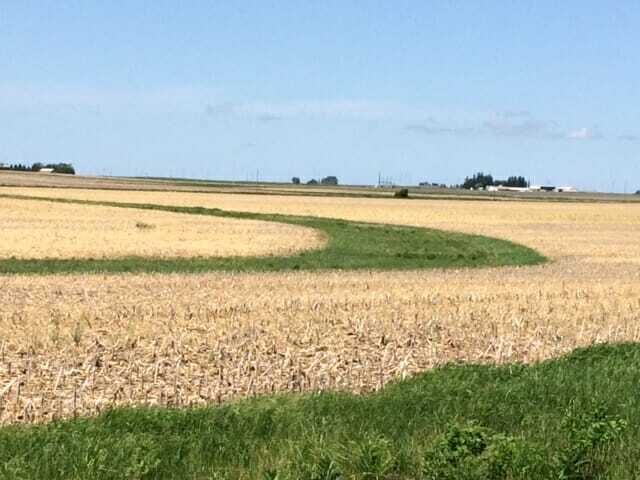
Everyone seems to be tired of politics. I have orders from within my house to write about something else – anything else! So let’s talk about farming…
Many recent news stories have reminded that electricity started here in farm country. In fact, it started right in my home county! The Reeve Electric Association Plant in Franklin County, now the REA Power Plant Museum, was the first farmer-owned power plant west of the Mississippi River. Some local farmers got together in the 1930s and formed a cooperative. In later years, a group of farmers formed a cooperative to buy inputs and sell produce. Some of my neighbors put together sow co-ops in the 1970s as a way to have a steady supply of healthy pigs.
Another angle on this concept of cooperatives is a group of farmers who live and work in colonies. I deal with “colonial farmers” for many of the inputs I use to construct and remodel pig barns. When I visit the colonies to get parts, I’m always fascinated by talking to the young men. Our chats give me a picture of their lives, and I know it gives them an idea of what my life is like.
Why am I talking about these forms of business or ways of living? Some of these systems and communities closely resemble forms of government. (I promise that I’m not talking politics now!) I find this topic even more interesting now that so many people a voicing their opinions on how a certain type of government is better, or more “fair,” than another.
History is filled with the answers to questions currently being raised! I once read a coffee table book about the history of the world. (Yes, I realize how ironic it is that such a heavy topic would be addressed in a coffee table format.) It was very interesting reading.
My point is that people change and evolve over time. We’re influenced by what happens in our lives, so everyone has a different perspective based on his or her experiences. Religious beliefs also greatly influence our thoughts and behaviors. History is filled with numerous examples of how religion plays a major role in most countries. Even countries that tried to eliminate religion were indeed influenced by religion.
History as a way of repeating itself, know. That’s why it’s so important that we take the time to study the facts! We all should research, read and make intelligent decisions based on facts rather than on the touchy-feely-feely, emotion-filled propaganda that certain groups disseminate. We all have minds, so we should use them!
-
Latham Hi‑Tech Seeds
Women in Ag: Tracing Emily Kuntz’s #RootsinBoots
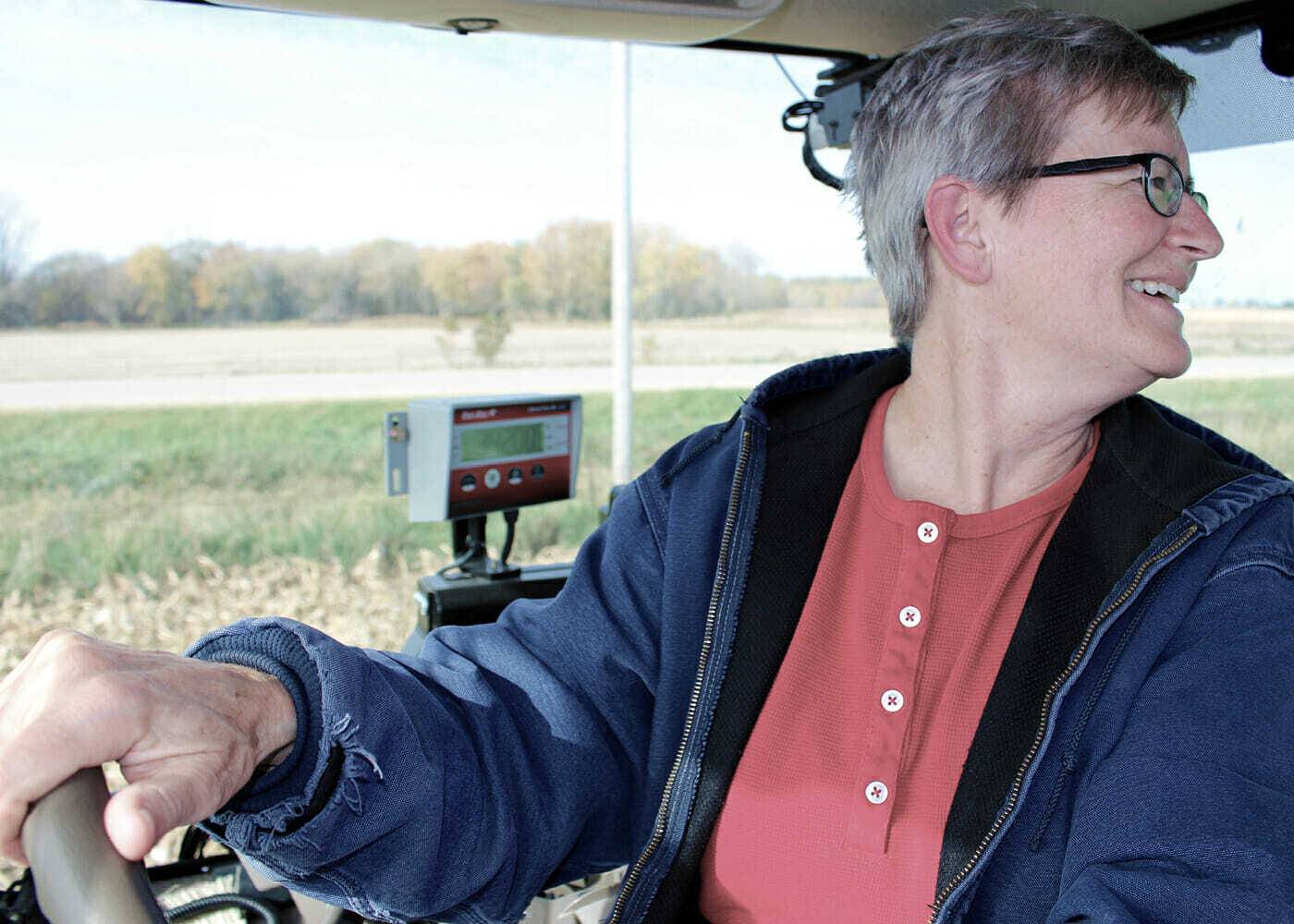
 This inspiring FarmHer just finished her 48th crop year in North Iowa. Married in 1976, Emily Kuntz (pronounced coo-n-tz) hasn’t gone a year without running the grain cart. Her husband, Rodney, spends each day by her side – just a few rows over in the combine.
This inspiring FarmHer just finished her 48th crop year in North Iowa. Married in 1976, Emily Kuntz (pronounced coo-n-tz) hasn’t gone a year without running the grain cart. Her husband, Rodney, spends each day by her side – just a few rows over in the combine.From the time she was a child, Emily (who goes by Emi), has spent as much time as possible outside. She grew up with six brothers and six sisters on an Iowa farm where she fell in love with production agriculture. With that large of a family, Emi had to help cook and clean the kitchen, but she jumped at any chance she could get to go outside and help her dad.
Helping with corn harvest has always been one of Emi’s favorite activities. She gets the same joy from farming with her husband, their son and nephew today as she found in the camaraderie she enjoyed while growing up farming with her brothers and sisters.
Emi is living her dream as a farmher. She’s also a respected mother, adored wife and beloved grandmother. Emi and Rod have two daughters, one son and seven grandchildren. She explains how her grandchildren’s eyes light up every time they ride in the tractor or combine and how much she loves their company.
It’s clear that Emi and Rodney have passed their work ethic to their children. Their son, Ramon, agrees his mother’s positive influence played a large role in his decision to farm.
“I never went to daycare as a child because I was just mom’s right-hand little man,” Ramon says. “I hope to someday give my kids the same experience that she gave me.”
Farming has been a family tradition on both sides of Ramon’s family. Emi’s #RootsinBoots date back to 1850 when her grandparents began farming here after immigrating, and Rodney’s family has been farming in North Iowa for 139 years.
After being in the industry for more than 40 years, Emi has a wealth of experience but her best advice can be boiled down to the following statement: “Make sure your heart is in whatever you do. It takes long hours, a lot of patience and tremendous amounts of hard work, but the ability to do what you love with the ones you love is irreplaceable.”
Find more inspiring #RootsinBoots stories below:
- Women in Ag: Tracing Amy Rohe’s #RootsinBoots
- Women in Ag: Tracing Kilah Hemesath’s #RootsinBoots
- Women in Ag: Tracing Jenna Braun’s #RootsinBoots
- Women in Ag: Tracing Ali Luety’s #RootsinBoots
- Women in Ag: Tracing Jessica Faust’s #RootsinBoots
- Women in Ag: Tracing Josie Burgett’s #RootsinBoots
- Women in Ag: Tracing Laura Daniel’s #RootsinBoots
- Women in Ag: Tracing Mandy Danner’s #RootsinBoots
- Women in Ag: Tracing Laura Cunningham’s #RootsinBoots
___
Without strong women to help shape and manage our company, Latham Hi‑Tech Seeds would be a very different company than it is today. We understand the key roles women play in everything from purchasing seed to marketing grain, from public relations and event planning to sales and customer service. That’s why we’re celebrating women who are doing what they love. From now through December, we’re showcasing women in agriculture by telling their #RootsinBoots stories. Follow along and be inspired by FarmHers across Iowa!
We’re looking for women, ages 18 to 108, who have a passion for agriculture and are willing to share their farm stories. Simply post photos of yourself on Instagram or Facebook using the hashtags #RootsinBoots #LathamSeeds and #FarmHer. Let your personality and work ethic show. We want to see what a “day in the life” of you is like!
Because each woman in agriculture is unique, everyone who submits a photo of herself either working in the field or working with livestock will be entered to win a $500 shopping spree at Western Edge LTD. There’s no limit to the number of entries, so increase your chances by posting across platforms via Twitter, Instagram and Facebook. Go to https://www.lathamseeds.com/rootsinboots/ or click here for more information.
-
Latham Hi‑Tech Seeds
Cultivating a Story to Share
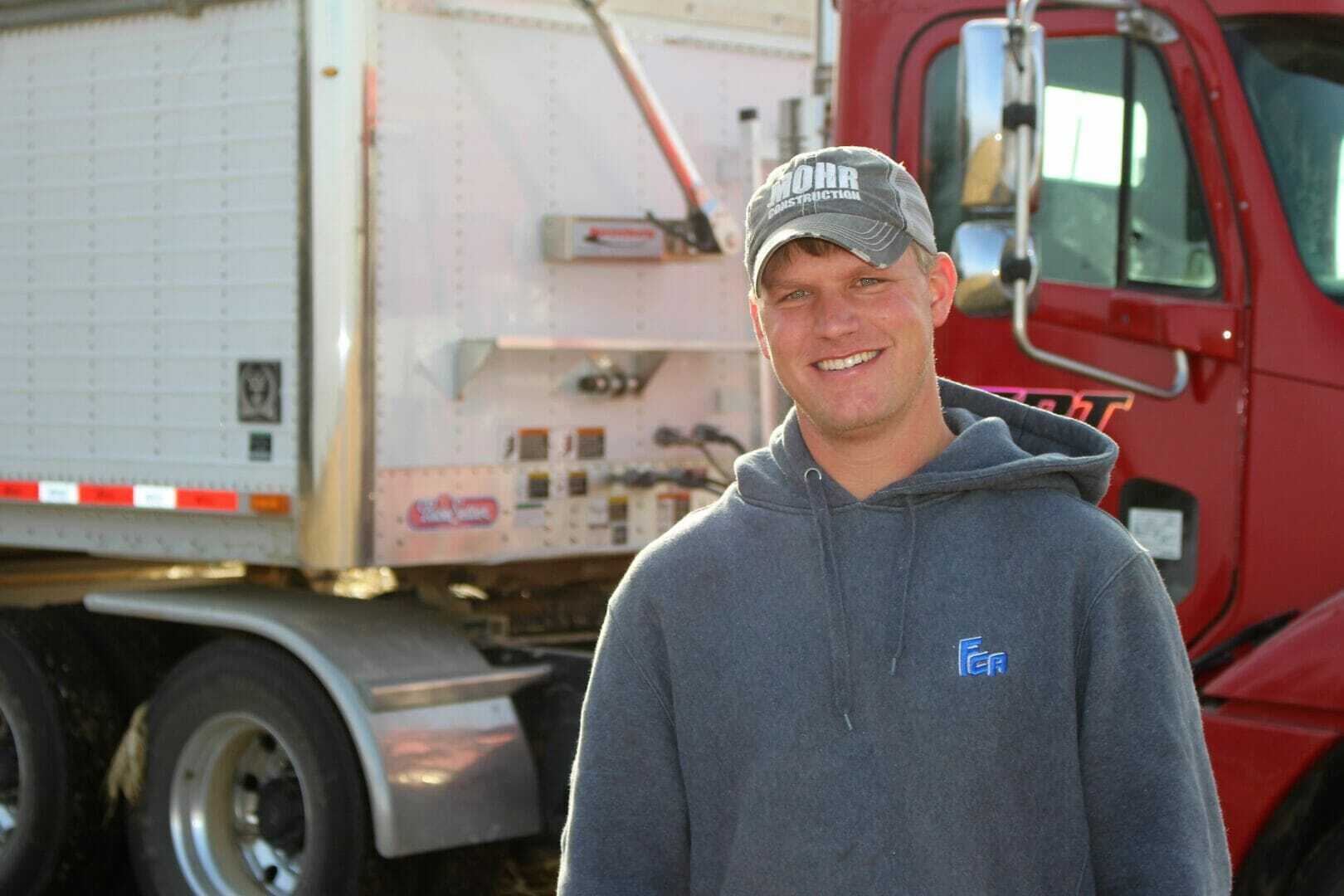
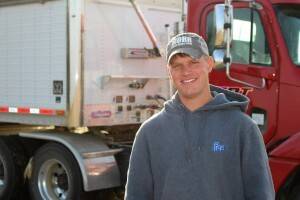 “Well Tate, are you going to help us run the grain cart?” The 11-year-old boy’s eyes lit up when he realized he was just given the responsibility of running the grain cart. He had heard stories about his grandpa’s farm and wished he could become a farmer someday.
“Well Tate, are you going to help us run the grain cart?” The 11-year-old boy’s eyes lit up when he realized he was just given the responsibility of running the grain cart. He had heard stories about his grandpa’s farm and wished he could become a farmer someday. With his feet hardly able to reach the clutch, Tate quickly realized how much he loved farming and wanted to follow his grandpa’s footsteps. Because he grew up outside of town and his family was not involved in agriculture while he growing up, got involved in farming by helping area farmers. He began working for a family friend on his farm when he was 11, and that experience led Tate to receive his Agricultural Business degree from Iowa Lakes Community College. He didn’t think twice about returning to the family farm in Odebolt, Iowa.
Growth and diversity are two qualities Tate keeps in mind when developing his operation. Tate’s first crop year was 2009, and his operation has continued to grow every year. He added feeder cattle in 2012 and plans to expand both the livestock and row crop operations in the future.
“Continual improvement” is Tate’s mantra. He has been updating his grandparent’s farmstead, where he hopes to live someday. He has built three grain bins, put new siding on the barn and built a lot for his feeder cattle. This spring he hopes to finish the cattle building.
“Grandpa loved raising feeder cattle,” said Tate. “I know the improvements and continuation of feeder cattle in my farm means a lot to my family, especially my grandma, who can see the improvements through her kitchen window.”
Although they’re not involved directly in agriculture, Tate’s parents have played an important role in supporting his dream. Tate’s dad, Dave, is a retired banker, so he reaffirmed Tate’s purchasing decisions. Tate has watched his mom, Twyla, pursue her passion as an elementary school teacher, giving him the drive to pursue his own his interests.
“My parents have always provided me with a voice of reason and have helped me see the big picture,” Tate said.
Along with offering advice for the growing farmer’s operation, Dave also taught Tate how to pheasant hunt. Tate enjoys hunting pheasant and deer hunting on his off time. He just enjoys the outdoors.
At the end of a long day, Tate says there isn’t anything better than sitting down to a meat and potatoes supper. Today we’re sharing his homemade barbeque sauce.
-
Latham Hi‑Tech Seeds
Check the Facts, then Check the Box

Participate in our Country’s Future by Voting
On this Election Day, I’ve been reading nasty remarks about politicians. These comments group all politicians together, which made me think about discrimination. With some of our candidates, I know that’s easy to do!
Then I read a Facebook post from one of my friends, who took exception. She was an elected official for eight years at the local level. Carol made some very good points about why she ran for office. She ran because she wanted to make a positive difference for her neighbors. On the local level, a person doesn’t seek public office for money or fame.
I’m friends with many people who either are or were elected officials. They’re nice, hardworking, giving people, who truly want to make a difference. Think about this for a moment… local officials can’t run into the grocery store, enjoy a meal out or watch their grandkids play spots without someone picking a bone with them. It makes me wonder why anyone would run for office!
Truthfully, there isn’t a perfect candidate. Some are saying that we must settle for the lessor of two evils in this presidential election, but I don’t see it that way. We should elect the person who most closely fits with our personal agendas. Yes, even I have an agenda!
There are many issues – mostly social issues – that I will not bend on. If I don’t vote, or if I vote for someone with no chance of winning, what is the result? If I vote for the person whose opinions are closer to mine, it still doesn’t guarantee that my agenda will get any further down the road but maybe, just maybe, it will.
Last week I joined a discussion underway on a friend’s Facebook page about the oil pipeline coming out of the Dakotas. One friend asked how this pipeline could be built when it’s causing so much damage to Indian grounds and the environment. I responded that not all information being pushed by mainstream media was accurate and suggested the facts be checked.
In no uncertain terms, other people jumped into the conversation. They either assumed or incorrectly thought I was against the protest. I would’ve liked to make the point that every American citizens has the right to freely protest. I even think it’s a duty! But I take exception to the way some folks are allowed to protest and destroy property, while others have been killed by simply driving to a town hall meeting!
The people who started joining in the “discussion” on Facebook weren’t interested in checking the facts. They were emotionally charged, and I felt like they weren’t interested in listening to my points. The mainstream media is NOT always correct! Because this post was made on the page of a friend who is very dear to me, and she was feeling uncomfortable by the comments being made, I walked away from the discussion.
The point I was trying to make then – and again today – is that elected officials should not have all the power. As citizens we need to keep that for ourselves! America won’t remain “We the People” without representation. It’s our duty to vote.
By not participating in this election, you make a decision – just not the one you should! No matter who gets elected, we can still carry on and make a difference. Participate in the future of this country. Your kid’s and your grandkid’s future depends on you!
-
Latham Hi‑Tech Seeds
Tracing Laura Cunningham’s #RootsinBoots: Building on Tradition
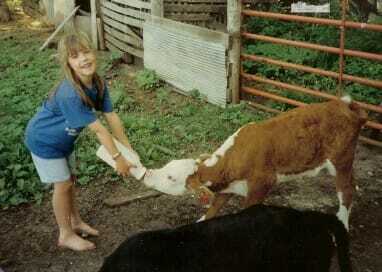
If someone were to ask me which experiences in life have shaped me the most into the person I am today, I would without hesitation include “the FFA” near the top of the list. It’s influence on my life started long before high school. In fact, it’s part of a legacy in agriculture started over 65 years ago.
My grandfather Leslie Ausen had a strong desire to go back to the family farm and work in agriculture after returning from service in World War II. The farm economy at the time was risky business for a newlywed, so Grandpa decided that if he couldn’t farm, he would teach. He completed his Bachelor’s of Science degree in Agriculture Education at Iowa State University as part of the graduating class of 1949. He then moved to Rockford, Iowa, to serve as the new Vocational Agriculture instructor and chartered the Rockford FFA Chapter that same year.

My Grandpa Les Ausen teaching students about corn production. The program was new to Rockford Senior High, but it didn’t take long for the chapter to grow and find success. Grandpa was proud of his students and enjoyed seeing them set and achieve goals in FFA and in their careers. Another favorite job duty was community education. He spent many evenings instructing ag continuing education courses for adults, helping with environmental projects around town and doing what he could to teach all in his community about agriculture. I asked him once what he thought his biggest career accomplishment was and he said helping two of his students (Nick Schmitt and Steve Weiner) achieve their Iowa Farmer Degrees. Now some 35 years later many of those same students are working farms alongside their children, or even passing their farming operations to the next generation. Grandpa remained with the program for 36 years retiring in 1985, but this is only where the legacy begins.
My father, Daryl, served as president of the Rockford FFA chapter in 1974. He later started farming and married the ag teacher’s daughter (insert Mom!). My brother, Eric, was president of the Rockford FFA in 2002. And, you guessed it! Building on tradition, I served as chapter president in 2006.
When I think about all I learned in the FFA, I think about a quote I read on The Pinkie Post: “FFA members win more in life because they learn how hard it is to lose and how to prepare to win.” FFA taught me how to prepare for success. Doing to Learn and Learning to Do (agriculture) so that someday I might be Earning to Live and Living to Serve (agriculture!)
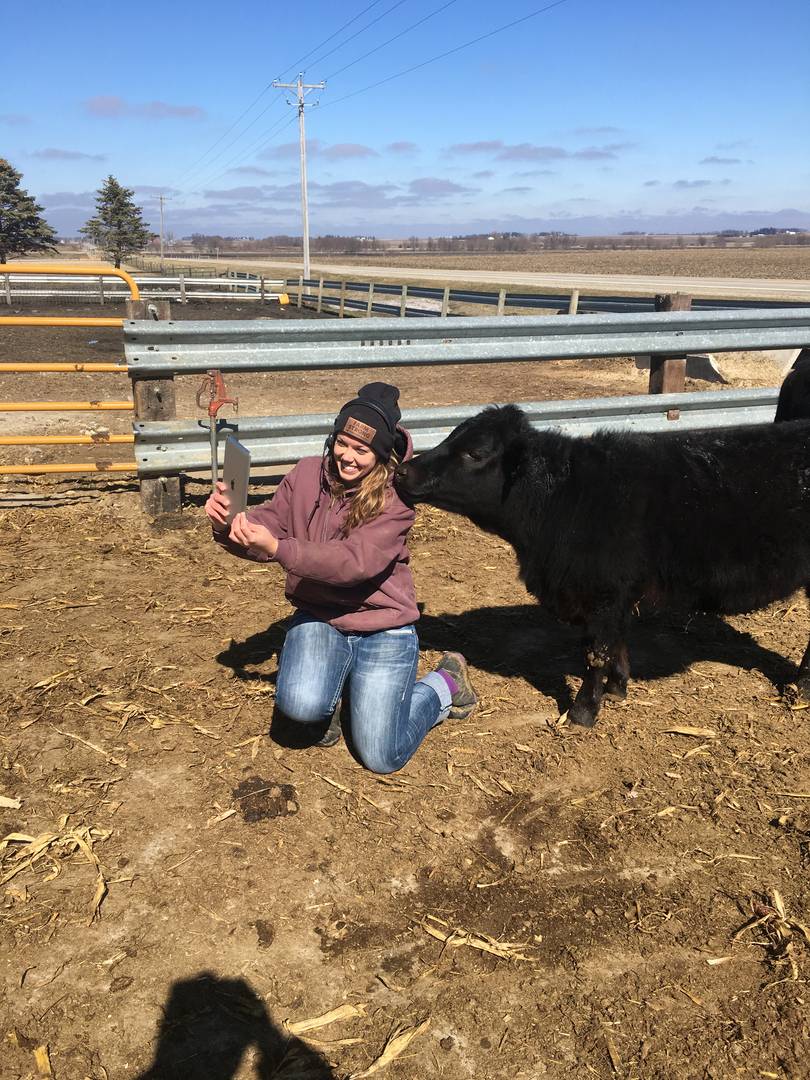
Laura and Lena Facetime Farmer Penpal with Central Springs 3rd Grade I always admired my Grandpa’s dedication to teaching ag. While my calling wasn’t to teach high school agriculture, I did follow in his footsteps attending Iowa State University College of Agriculture and Life Sciences to pursue a degree in Ag Business. In 2008, I took a marketing position with family-owned Latham Seeds, helping teach farmers about the newest seed technologies in the industry.
I’m also proud to have married into a farm family and own a cattle operation together with my husband, Aaron. We market our beef direct to consumers. Some of my favorite days include opportunities to give tours of our farm and put someone in a tractor for their very first time. I enjoy volunteering with our county and state Farm Bureau, advocating for young farmers. This past spring I started a new project with my local elementary school called “Farmer Penpal.” Each week I Facetimed with a class to show “day in the life” on the farm- LIVE! Together we watched calves take their first steps, watched a semi load of soybeans get hauled into AGP and discussed how the oil may someday make their crayons. Such a rewarding project!
If I were to give advice to someone preparing for or currently working in a career in agriculture, I would say “find ways to share your story!” It’s great if you can use social media (follow me on Instagram! @LifeonSkyView). But it’s even better if you can join and be active in a commodity organization or with students in a classroom. Only 15% of America is lucky enough to help produce, process and sell our nation’s food, fuel and fiber. Help the other 85% learn about it, too!
My #RootsinBoots started early on the farm raising cattle together with my dad. It grew stronger through 4-H, FFA, college studies and back to a family farm. My #RootsinBoots represents a legacy. It’s a passion for sharing agriculture with farmers, neighbors and my community. It’s a life I wouldn’t trade for the world. And it’s a legacy I hope to pass on for many generations to come.

Laura Age 5 Bottle Feeding Triplets on Larson Farms 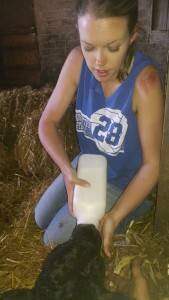
Laura Bottle Feeding a Calf on SkyView Farms -
Latham Hi‑Tech Seeds
Sometimes “Listening” Isn’t Enough

This past week on Facebook, I posted a graphic of my quote in Michele Payne’s book, “No More Food Fights” in which I emphasize the importance of listening when engaging in a conversation. Today I’d like to expand on that…
Monday on my Musings of a Pig Farmer Facebook page I shared an article about the Dakota pipeline and related protests. Listening, in this case, to protestors may not be enough as Scott Gates points out in a Facebook article posted Oct. 24, 2016. He explains how he researched the protests and found that many of the most vocal protestors never engaged during the public comment period.
In this era of mass communication, how do you determine what the facts are? Normally, you just need to “follow the money to find the motive.”
I’m going to use the term “protest” lightly because it’s more of a takeover of private property. Most “protestors” are bused in from outside the area and many are paid to participate. Outside groups with an agenda are using this situation to build public opinion. I know because I’ve personally experienced paid protestors who have been brought in to influence public opinion around the building of hog barns. I attended hearings where neighbors broke done in tears as they testified how terrible the new barns would be to them, yet they didn’t have any personal experience upon which to base their information. They got worked into a frenzy by activists, who worked them into a frenzy by telling them how they would suffer. After the barns were built, these same neighbors who gave the emotional testimony, asked me when pigs would go in the barns. They didn’t realize pigs had been in the barn for months!
This same scenario plays out in so many places. The fear of the unknown plays a large role in public opinion, and the void of compelling facts seems to be easily filled with scare tactics. This is the case with large farms, GMOs, water quality… the list goes on and on.
Fear also is driving many political and social discussions. I’ve had some very good discussions lately about some of these issues, and “discuss” is what we should do! Like everyone, there are some issues on which I simply will not comprise my personal beliefs. As with most things in life, however, compromise and negotiation go a long way toward finding a solution.
Simply withholding your vote because you don’t think any of the candidates running for office really isn’t a solution. In one week, we will elect many people to many offices: local, state and federal. All of these offices are very important, so I will exercise my power to vote. I have listened. I have read and researched the candidates. I have analyzed their actions and positions. Soon I will make the best choices I can to make this a better country. I encourage you to do the same. Make your vote count!
-
Latham Hi‑Tech Seeds
#RootsinBoots: Share and Be Entered to Win!
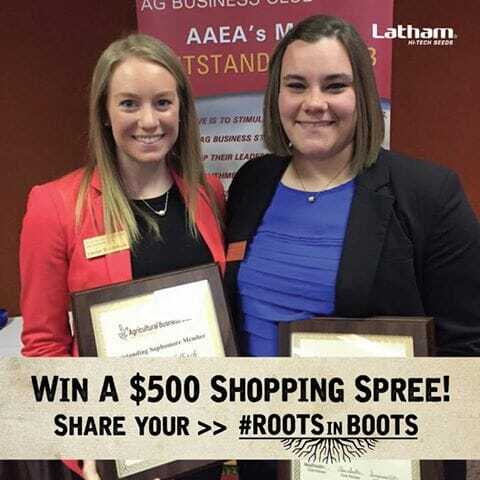
We’re half way through our #RootsinBoots contest series and hope you’ve enjoyed reading stories from FarmHers across Latham Country! Did you know, Latham Seeds is sponsoring a contest to help support the FarmHer mission to raise awareness of Women in Agriculture? Entering is so simple!
1. Post a photo of your role in agriculture, whether it’s driving tractor during harvest, caring for cattle on pasture, attending an Animal Science lecture on campus or providing the inputs our farmers need to raise food, fuel and fiber for the world. It’s all a part of a FarmHers #RootsinBoots!
2. Post your photo to social media- Facebook, Twitter or Instagram and use the hashtags: #FarmHer, RootsinBoots and #LathamSeeds.
The contest runs through November 21, 2016 when we’ll select one winner to receive a $500 shopping spree to the Western Edge, LTD.
Winners must be 18 or older to enter. All photos may be subject to use in a future Latham Seeds campaign. All entrants must be comfortable representing a family-owned and independent seed brand.
